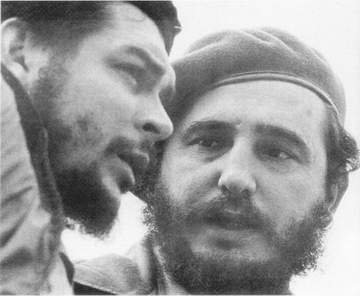


Notice: This is the official website of the All Empires History Community (Reg. 10 Feb 2002)
January 1st: Cuban Revolution |
Post Reply 
|
| Author | |
Maju 
King 

Joined: 14-Jul-2005 Online Status: Offline Posts: 6565 |
 Quote Quote  Reply Reply
 Topic: January 1st: Cuban Revolution Topic: January 1st: Cuban RevolutionPosted: 31-Dec-2005 at 21:25 |
|
Happy new year, btw.
 Today, in 1959, the revolutionary forces led by Fidel Castro and Che Guevara entered in La Habana (Havana), forcing dictator Flugencio Batista to flee the country. Castro's success followed a decade of active opposition, mostly by armed means in which he, along with many other revolutionaires, tried to overthrow the tyrant. After several failures, Castro and his guerrilla managed to create chaos in the country and finally, today, 47 years ago, they entered the capital.  Fidel Castro with Ernesto Che Guevara Once in power, Castro maneouvered to keep control, displacing and even imprisioning other revolutionaries and causing the first massive flee from the island towards Florida, people, who considered counter-revolutionaries, were dubbed as "gusanos" (worms). Soon, the USA rejected the possibility of using US owned refineries in the island to proccess Soviet crude, to what Castro responded nationalizing these refineries, along with any other US owned property in Cuba, mostly United Fruit plantations and ITT assets. In May, the new government started the agrarian reform. In 1961, in response to these socialist policies, the USA broke diplomatic relations and, in 1962, imposed an embargo on the island, which is still in effect. Meanwhile, the invasion of Bah�a de Cochinos by a group of CIA armed Cubans, was a total failure. n 1962, another crisis followed: Castro, who was each day closer to the Soviet Union, was planning to stabilish a defensive arsenal of Soviet nuclear missiles in the lines of the one that the USA still has in Turkey. When the CIA discovered it, US President, John Kennedy declared a naval blockade on the island. This was the moment humankind was closer to a nuclear war ever. Fortunately, high level diplomacy managed to sign an agreement that provided for the retreat of the missiles from Cuba (and Turkey) and guarantees that the USA would not invade the island. Cuban socialist regime, though despised by many, has also been placed as example by others, specially when compared with the situation of other Latin American and Thrid World countries. Despite the blockade, recently aggravated by blackmail to third parties and the vanishing of its former Soviet ally, Cuba has managed to keep a GDP (PPP) per capita better than some of its neighbours and definitively much more equally distrbuted. Its health policies are still one of the best of the continent, exporting physicians to many other nations. Cuba is rated high in the UN Human Developement Index (2003), ranking 52nd, which places it along with a handful of other Latin American nations, in the "high developent" area. Yet the incognites for the future are many and nobody knows what will happen when aged but still popular President Castro dies. Some other things that happened today:
 Asteroid Ceres as seen by Hubble telescope. The brilliant white spot is still a mistery
 Frankestein was repeatedly adapted to make films. Above is the poster of the first one, starred by Boris Karloff
  The Zapatista rebellion has created some modern icons: the Zapatista flag and Subcomandante Marcos are maybe the best known
|
|

NO GOD, NO MASTER! |
|
 |
|
Post Reply 
|
| Forum Jump | Forum Permissions  You cannot post new topics in this forum You cannot reply to topics in this forum You cannot delete your posts in this forum You cannot edit your posts in this forum You cannot create polls in this forum You cannot vote in polls in this forum |
Bulletin Board Software by Web Wiz Forums® version 9.56a [Free Express Edition]
Copyright ©2001-2009 Web Wiz
This page was generated in 0.063 seconds.
Copyright ©2001-2009 Web Wiz
This page was generated in 0.063 seconds.











 Printable Version
Printable Version Google
Google Delicious
Delicious Digg
Digg StumbleUpon
StumbleUpon Windows Live
Windows Live Yahoo Bookmarks
Yahoo Bookmarks reddit
reddit Facebook
Facebook MySpace
MySpace Newsvine
Newsvine Furl
Furl Topic Options
Topic Options